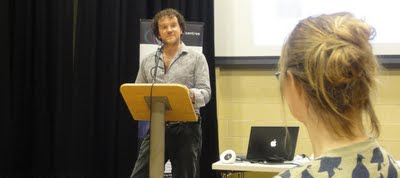Irish Peace Centres launched their report into LGBT Communities’ Experiences of Faith and Church in Northern Ireland on Wednesday afternoon. Coordinated by IPC’s Pádraig Ó Tuama, researchers Dr Claire Mitchell (co-author of the book Evangelical Journeys I posted about recently) and Dr Gail McConnell had recruited 23 participants and listened to their stories and perspectives about faith and church in Northern Ireland.
I spoke to Claire, Gail and Pádraig after the launch:
Personal stories are a powerful way of clearing away the sanitising barrier of academic language and painting a picture of how real people say they experience the world around them.
The stories that Claire and Gail listened to were sometimes surprisingly hopeful and encouraging, yet often predictably demoralising and discouraging. The report sets out the social, religious and legal context in which LGBT people live, and then discusses the participants' experiences under a number of themes.

Irish Peace Centres examine the relationship between faith, conflict and peace. Homosexuality is a regular source of confrontation and continues to be a social divide in Northern Ireland. They plan to follow up this report with one looking at the experience of clergy in order “to give voice to narratives from within the religious sector”.
Participants in the study spoke about struggles towards self-acceptance, as well as tensions in relationships with family and friends … and often with the ‘gay scene’ as well as churches.
Acceptance within churches ranged from “caring and non-judgmental”, through more conditional welcomes (where change was expected – perhaps through ex-gay therapy), expectations of accepting the condition of singleness or even “don’t ask don’t tell” approaches (where ministers insist that LGBT worshippers must “keep it low key”, all the way to rejection.
Politically-correct language didn’t always equate with acceptance or understanding. One participant explained:
“Just because you hear same-sex instead of faggot does not mean that you are accepted.”
All Souls Non-Subscribing Presbyterian Church was singled out by a considerable number of those interviewed as a place of acceptance. One woman described the spiritual opportunity that church provided:
I never thought I’d be a member of a church. I’m still in disbelief that that could be. It was like a homecoming, a spiritual experience to be accepted. I was very emotional the first time I came to the church – I felt fear, disbelief, acceptance. The first time I went [...] I couldn’t help it, I burst into tears. Tears just streamed. The hymn we sang was ‘Be still in the presence of the Lord’ and just like that [clicks fingers]. It was a spiritual moment for me and very powerful. It was a homecoming – coming in from the cold after many years. I could be here and not feel like a reject and a very bad person – an evil person. And [now] I’m a member of the church.
The stories are powerful and personal and deserve to be read.
Former President of the Irish Methodist Conference, Rev David Kerr, responded to the report at yesterday afternoon’s launch. He spoke about minority, pointing out that “in the first 300 years of its life, the Christian Church had flourished as a minority – often a persecuted minority”. Later on he also conjectured whether the church needed to define “a bare minimum of absolutes [in order to] live with diversity”.
You can hear the report’s launch and Rev Kerr’s remarks in the audio below.
The report featured in a recent post on the Will and Testament blog, and was discussed at length on last weekend's Sunday Sequence. Update - you can also hear the debate as part of Gladys Ganiel's blog post on the subject of the report and the item on Sunday Sequence.
1 comment:
I'm a bit weirded out cos I read this post this morning then spotted Padraig when I was in Common Grounds this afternoon!
Post a Comment